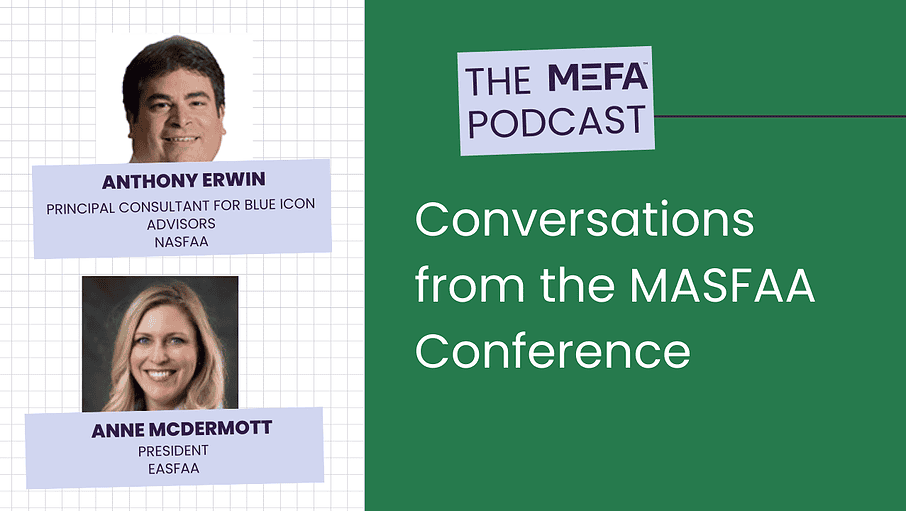

Resources Mentioned in this Episode
Jonathan Hughes: [00:00:00] Hi folks, and welcome to the MEFA Podcast. My name is Jonathan Hughes and I’m the host of the MEFA Podcast, and we have something a little different for you today. This is something like a bonus edition of the MEFA Podcast. And you know, typically with these shows, we are addressing families or students. And while any families or students are certainly welcome to listen to this show, this episode is geared more towards our colleagues in financial aid offices.
Now, if you’ve heard me talk at all, you’ve probably heard me extol the virtues of the financial aid office as a resource for students, and they’re certainly invaluable partners to MEFA as well. In this past November, the annual conference for MASFAA, the Massachusetts Association of Student Financial Aid Administrators was held [00:01:00] in Plymouth and I was lucky enough to be joined by a few speakers at that conference on this podcast, and we recorded our conversation for you to enjoy. So you’re going to hear some thoughts from Anthony Erwin and Anne McDermott. Anthony Erwin has had a long career in financial aid, including stints at Northeastern University, Stonehill College and Bridgewater State, as well as a long history of volunteering. In fact, he served as a past president of MASFAA and of EASFAA, which is the Eastern Association of Student Financial Aid Administrators, and he now works for NASFAA, the National Association of Student Financial Aid Administrators for their Blue Icon Division, which you’ll hear him talk about in just a minute.
Ann McDermott is the Director of Financial Aid at Salve Regina University in Rhode Island. It has had St. A Fisher College in Boston and Montserrat College of Art in Beverly. She’s also the current president of [00:02:00] EASFAA. Now, I do have to apologize for some glitches in the audio in the video. Apparently just one of the dangers that you can’t anticipate when recording on location, so my apologies to the guests particularly to Anne and to you.
The audience, but let’s jump to our conversations with Tony and Anne and hear them talk about their current roles and responsibilities.
Anthony Erwin: So, Blue Icon Advisors is a wholly owned subsidiary of NASFAA, the National Association of Financial Administrators. And, we are in existence for about three and a half years, and we offer consulting services to colleges, universities across the country.
And so we’re, NASFAA as a membership organization provides services and support for, you know, thousands of members, across the, across the country, our focus is really, much more customized solutions specific to challenges that institutions are facing. We offer both individualized and group coaching, so individualized coaching for new financial aid leaders who perhaps, have many years of financial aid [00:03:00] experience, but have not had leadership roles before or in some cases. Who have many years of leadership experience.
Very few years of financial aid experience, and we’re helping bridge that knowledge gap. And we also provide group coaching for both new and aspiring financial aid directors. In my role as principal consultant, I oversee our business development efforts as well as manage a number of the projects that we perform.
Projects range anywhere from interim staffing and leadership to offices to conducting compliance or operation or service reviews of offices for, for looking to improve.
Anne McDermott: So, I’m Anne McDermott. I am the director of Financial Aid at Salve Regina University in Newport Island. We have been living in Newport for about eight years.
I’ve been at Salve for all of those eight years, prior, and I’m this year’s EASFAA president. Prior to living in Newport, we were in Beverly. So we lived in Massachusetts for a long time, so I’m a prior MASFAA member as well. So I worked, I worked in Boston at Fisher College for quite a few years and then, I left Fisher when I had my first child and I worked at Montserrat [00:04:00] College of Art, which was closer to home where we lived in Beverly and then after that, then we moved to Newport.
Jonathan Hughes: I was curious though, as to how Tony and Anne landed in financial aid.
Anthony Erwin: So I, attended Stonehill College as an undergraduate student and, in the spring of my freshman year, I was starting to look for summer jobs of that year and saw a posting, that the financial aid office was hiring a full-time work study student for the summer.
I lived locally to Stonehill and, so I decided to apply, for that. Got the job and that’s what started my journey in financial aid, which happens to many financial aid professionals who might start as a work, say student. I spent that summer and then the next three summers, all three of the summers, I was a, you know, between my, after my freshman year through graduating, working in the office, I worked throughout the academic year as a gosh, it’s so funny as a junior or senior, I don’t remember now cuz it’s been so long. , it’s been more than, more than many minutes I did an internship[00:05:00] in the financial aid office, I think part-time during one of the academic semesters and, Eileen O’Leary, who was the former director at Stonehill, who was a longtime friend and mentor, offered me the opportunity to attend the College Board’s® Institute on financial aid I think as a senior, if I remember correctly. And, attended that and never left the profession. Started there and, and never left.
Jonathan Hughes: And what was it that appealed to you about that?
Anthony Erwin: The intersection of the ability to work with people, right. To have the interaction with students and families and colleagues and have that interaction with people, but also have a large component of your job that was about process and organization and, and the math. Right? And the, and the eligibility and the rec to me was just, I love the combination of those things because I could not see myself doing either of those things all of the time. And the opportunity to combine both of those things, I thought, I just really just found it compelling because you were you were doing what someone considered to be, you know, the most boring kind of work, but it was directly related to helping the people that you might have just talked to or that you would might be [00:06:00] talking to tomorrow in the intersection of that. To me, it was just very interesting at the time and I ended up shaping, I was, I think I was in my junior year before I declared my major, I ended up declaring a communication major at Stonehill and a business, minor. And I don’t think I declared my communication major till then, partly because I, I didn’t. There’s no financial aid major, right? As an undergraduate, but I was headed in that direction and I really liked the intersection of both those things.
So I ended up, I won’t say I specifically chose my major because I wanted to be a financial aid professional, but the, communication element to me was always very, very interesting.
Anne McDermott: So I have a little bit of a crazy story, and I won’t get into it just for the sake of time, but I will give you the very brief version. After I graduated from college, I started working in college admissions. Loved working in admissions, but was just sort of ready to move on. My boss, which now I think is crazy, was like, well, there’s a Director of Financial Aid position open. I had no experience in financial aid, but he was a [00:07:00] big believer in transferable skills and was, you know, pretty confident that, you know, he could, if offered this job that I could move over there and be successful.
It was rough in the beginning, and as you can imagine, it was also very rough on my staff, to have a new boss who didn’t know anything about financial aid but I, at the time, we had like the plain old printed out FSA handbook and I took that thing everywhere. And eventually got caught up. But it was, it was definitely a very difficult transition in the beginning but fast forward 15 years to today, I am so much happier working in financial aid than I would’ve been, I think if I had stayed in admissions.
Jonathan Hughes: I wanted to ask Anthony about the national scope that his work has. One of the things that always interests me is how different the aid landscape is in different parts of the country
Anthony Erwin: you know, we certainly don’t, we’re not the only [00:08:00] part of the country in New England that has the, the, the depth and breadth of institutions, but what stands out, right? You can England, you really just have such a substantial depth and breadth of institutions and, That s a lot of opportunities. So you, so you have that, is, is kind of a major difference from, from many parts of the country and, you have the oppor- I think about it and from a different, you know, one of the lenses I think about this a little bit, and its kind of the, in the, in the context of volunteerism and professional development and how really, you know, how some of the states and regional associations are different than others.
And I think, you know, one of the positives in Massachusetts and New England is, you know, the, the, the geography is allows for. Easier interaction, right? So you don’t have to get on a plane generally to see anybody who you need to see or have an event pretty much anywhere in New England. You may prefer to, but you don’t have to. Versus other parts of the country where you’re, you know, in Texas, right? You, are flying to get everyone in the state in a location in many cases, or certainly in California. And I think that that allows for familiarity [00:09:00] among the states in New England, that may not happen other places, so there may be lots of familiarity in, inside the state or in regions of the state.
But because of how compact New England is, we experience that same kind of familiar relationship across several states that other parts of the country may only have it within even a region of theirs. So you, so you get to, I think, experience what life is like at a lot of different types of institutions in a different, in different parts of New England that you might not otherwise experience in other parts of the country where just the distance doesn’t allow for that.
So you get, a little more of that depth. I don’t want to suggest at all that my colleagues come from other states aren’t, are not fully engaged with their, with their peers, and. All that. But, but you know, I will say on, on probably the more humorous side, you also do get the funny where, where I, you know, I might hear one of my colleagues from, from Nebraska who says, you know, that she’s going to drive, you know, seven hours to attend a meeting.
And I think that’s the most insane thing I’ve ever heard. If I drove seven hours, I could be in DC right? Or I could be in Canada, or I could be on a plane and I could be in Europe. But that’s like, that’s just a normal drive. That’s the commitment that [00:10:00] they’ve made to work with each other and to do the professional development that they want to do and the professional association involvement. I’m not sure New England here would do that because we don’t. We’re, you know, so, you know, we don’t, we don’t have those long car drives that, you know, to, volunteer. But it is interesting having spent my whole career in New England and now having a, you know, an opportunity for a much broader national view.
Just how much experience you can get for different types of institutions, different types of students, with really not having to move too far from where you are. One thing that I, that it also strikes me as, probably a little more challenging that we might have is I also think because of the number of institutions and the, and the number of professionals, sometimes it’s been easier in, in a state like Massachusetts that has so many schools and so many profess, To assume that someone else is going to do the work when it comes to, for example, stepping up to run MASFAA or to organize a conference like this, or to do any number of things that we all benefit from because there, there are just, you know, hundreds of potential people to do it.
Versus in other parts of the [00:11:00] country where there are fewer institutions, fewer professionals, those folks are, there’s a direct impact like the. There’s almost more of a sense of an obligation in those parts of the country because there’s a fewer number of people who can do it versus here where there’s a huge number of people can do it, but then sometimes nobody does it. Or fewer people do it because everyone thinks someone else can, because there’s plenty of people who could.
Jonathan Hughes: Yes. Volunteerism. We talked a lot at the conference about how important it is to volunteer for professional association, so I. Two leaders who could speak personally to their experiences volunteering and why it was important to them.
Anne McDermott: I think that EASFAA and, and really volunteerism in general fills that like social hole for me because I am by nature, like I do like to get out and meet new people and have like all of the conversations with friends on the road and volunteering has given me that opportunity in a smaller way so that I do feel like I’m able [00:12:00] to like, scratch that itch shall I say like, you know, that I’m able to get that piece of me, you know, out there. But with, as far as volunteering, I didn’t volunteer right away. My first few years in financial aid, I had a very full plate as we talked about and volunteering was just not on. My radar, the Rhode Island Student Financial Aid Association is small.
So somebody had asked me, you know, are you interested in running? This was after a few years of you know, involved, but not in any official capacity. Somebody had asked me if I wanted to run for president, and at the time my second child had was just born. And I was like, I don’t know. I don’t know if I can do.
And then I was like, you know what, yes I can. And truly the reason why I said yes was because I felt like it was my turn. You know, Rhode Island, there’s only, there’s only so many schools and you know, we kind of just rotate around, you know, like each director or associate director or any other willing person [00:13:00] from any of those offices just kind of take turns, you know, that it’s your turn to be president.
And I felt a little bit like, oh, well, salve hasn’t had any representation for a little while. It’s just my turn. It’s the right thing to do. So I. And has turned into now, I’ve been serving, so that was my first, so Rhode Island, when I was the Rhode Island State representative. I served as the Rhode Island representative to EASFAA and I’ve been, on the EASFAA Council now for seven years. So it’s been really great.
Jonathan Hughes: And so what would you say are some of the benefits of, you know, being part of that professional association?
Anne McDermott: I think that volunteering has given me so much more than what I have given the association. And really the thing, the one thing that it boils down to is the opportunity to network.
You know, financial aid, jobs are not easy and there’s no way that one person is going to know every single thing and having a large network of people to call upon when you don’t [00:14:00] know how to do something or there’s a regulation that comes down and you just need somebody else to read it with you and see what their interpretation is I have found that having that wide network that comes through, volunteering has been professionally the best thing that I could have done.
Anthony Erwin: You know, when I started, I, I mentioned my, my longtime friend and mentor, Eileen O’Leary, Pam Gilligan, who was the Director of Financial Aid at Berkeley College of Music, my first Boston or professional setting. Those. First of all, they led by example. So those were the, they were leaders who were deeply engaged. And so they set that example, but they also set that expectation. So I don’t, I don’t actually recall a time where I was ever voluntold to volunteer. I was certainly voluntold to do many other things in for my career, but to volunteer it.
But, but it was never, it never seemed optional because I worked for people early in my career, starting as a work study student through early in my career, who did that and first of all just made it [00:15:00] engaging and, rewarding, but also just set the expectation that this is what you do. So, so my journey starting on that wasn’t, it wasn’t like one day I thought, oh gee, I’d like to get involved in professional development.
It was it, it was, I’m, I have to like, I have to because it was just seen as something desirable. And I, I think the, you know, the benefits to the individual, I, I can’t, I couldn’t possibly stop listing the benefits to me as a professional for all the relationships I’ve made, the places I’ve been, the things I’ve gotten to experience and the opportunity to give back is, has been so rewarding over, over many, many years. There’s also benefit to institutions and so I, I talked about kind of the individuals, but I have also been very fortunate that the institutions I have worked through over my career have, have also supported and expected volunteerism and generally for one, one and or two reasons.
The first is, because they, you know, they, they have understood the value of promoting the institution through having highly engaged professionals, and [00:16:00] that is, that is a means of promoting the institution. The second is, you know, most senior leaders in institutions want information about what’s going on external to the in institution.
So as an aid director for example, I would be asked, you know, some, some new regulation, some problem, some opportunity, you know, what’s going on in the field. And if I literally never leave my office and have no relationships outside, how am I going to answer that question? And so you know, I, I always try to make the case for my colleagues who struggle with getting the commitment from their institutions around professional development time for volunteerism.
That there’s actually not just value to the individual, but there’s value to the institution. That is, it is part of the brand building of the institution, but also you bring information back that is valuable. And if they never let you leave your door office, you’re never bringing any new information back, around that so I think there’s lots of value there. And I think, and I know that I’ve spent really my whole career. Deeply engaged for those reasons. It’s also, you know, just the way to it is just more [00:17:00] fun, right? Who, who there are parts of being a financially aid professional that are very, very not fun.
right? Incredibly not fun. And so you, you know, the opportunity to engage in and in both advancing the profession, advancing the work we do for students, but also just having fun with, with colleagues across the country makes a huge difference. And it makes something more of a profession and less of a job.
Jonathan Hughes: Related to supporting your colleagues. I asked Anthony and Anne, what are financial aid offices experiencing right now in these uncertain times and, and where do they need support and how can we support them?
Anthony Erwin: It would come, probably would come to no surprise to any of your listeners that just overall staffing levels are a substantial pain point at this point for many, many offices.
And, and whether it be because, of retirements, people making different choices about, you know, their, staying home with children or different choices about how they want to spend their time and energy and their work, whatever the drivers, the, when you add up. There is a, you know, a substantial gap in, in talent, in the financial [00:18:00] aid profession right now. And that is a pronounced pain point for many institutions. And we hear that at Blue Icon, really across the country. So, so historically, you know, that might be true in an area of the country where it’s. There are less institutions, less population. The geography is, is not so friendly for, you know, for, recruiting in a reasonable distance.
We never heard that in Massachusetts, right? We never heard that in Connecticut or New York or in the Mid-Atlantic because there’s such a density of population in schools. We hear that everywhere now that there is just a talent gap in, aid and so the result is institutions are taking longer to fill positions. And when they are filling positions are offering hiring with less experience or no experience versus what they might have otherwise hired. So it introduces Then the second pain point is there’s a, you know, a deeper training curve, right? There’s, so it takes longer for that new person who you’ve really waited a long time for.
Defined and you’re super excited about, but it takes longer for them to really be super productive in the job because they’re coming in many cases now with no or [00:19:00] very limited experience based on what historically we as hiring supervisors may have hired five years ago for those same types of positions.
So it introduces kind of that next pain point. So that’s a whole huge bucket. I would say, next big bucket is kind of the pace of change in institutions, you know, during and post pandemic. Many institutions who perhaps have never, many institutions are changing academic format, program offerings, you know, doing things that they never did before, which introduces both potential compliance risks and operational needs.
And some aid professionals are well positioned at their institutions to address those concerns and others aren’t included in those conversations. And so, if I was going to strive it as a pain point, it’s when institutions are moving faster than they’ve ever moved. But not having their aid leader as part of that conversation.
That is a pain point for many aid offices. Our work at Blue Icon are on our individual coaching. Certainly our group coaching is really trying to help newer financial aid professionals and leaders develop their voice right, to both [00:20:00] understand the materials, the reference materials, their utilization.
But also how to represent that in a collaborative way on their campus so that they are, they are positioned to be partners in, growth and change and not just processors or gatekeepers around that.
Anne McDermott: I mean, definitely the great resignation, has affected all of us. I have not suffered in my own office, but, my staff have stayed on, which I am forever grateful for.
But, many offices at Salve are short staffed and I know that many of my financial aid colleagues. So yeah, people and we financial aid, the financial aid community in general needs staffing. Years ago when these jobs were classified, I think that they were classified, as, you know, simpler jobs than what we are doing today.
The jobs, the financial aid, counselors now are, Least, in my opinion anyway, the, the job is very different than it used to be, a few years ago, even, you know, five, 10 years ago, we’re dealing with more regulations, [00:21:00] students who are having mental health crisis, and who just need some extra help.
And I wish that the pay scales reflected, really what we’re doing today rather than what the jobs were classified at years ago. So I think that that’s, Making the staffing issue even harder, because there’s other industries or other areas of higher ed that someone could get into, that might be more enticing for, particularly for a young person who’s just joining higher education.
Jonathan Hughes: How can we support aid administrators improve?
Anthony Erwin: To the question of morale? I always feel like, and, and probably more so whenever, you know, there’s always two tracks from me, from morale. There’s the, there’s the daily just trying to create a positive environment for the people you’re working with and having good working relationships and, and having moments of, of joy.
And where can you find those at the time when you are responsible for things that sometimes can feel joyless. But finding those moments of joy in working with each other and, and empowering, you know, [00:22:00] members of a team that, that are pre-determined to be good planners of fun, right? And let them let ’em go. I always feel like there’s a track there, but there’s also a track around morale. That to me is a deeper issue, which is around feeling engaged and valued as a professional. And that doesn’t come unless people feel like they have. And that the work that they do matters so that there’s a connection to that work, to student outcomes, to perhaps the, the long-term mission of the institution, the long-term success of students.
Jonathan Hughes: I wanted to ask Anne in particular, how she would advise someone who is new in the field?
Anne McDermott: One of the things that I talk about a lot is just building your network, like we talked about earlier in like, how can you do that? Well, the first step is like a, just a little tiny baby step into volunteering.
Like maybe it’s just volunteering on a committee within your state association. That’s a light lift. Most of those roles are maybe an hour a week, but it gives you access to so many people. Because at least for me anyway, the [00:23:00] networking piece has been so helpful. But also like somebody who’s brand new coming into financial aid, I would tell them to get very familiar with AskRegs.
Jonathan Hughes: What was AskRegs?
Anne McDermott: So AskRegs is a NASFAA tool that you can type in your question and, and get an answer to regulatory, you know, any regulatory questions that you can see what other people have written before. You can have somebody from, you know, someone weighs in a professional weigh in on what the answers are.
But it’s really a helpful tool in trying to understand what some of these complicated federal regulations really say. And like I said, there’s just, there’s so many people out there who are willing to help. Financial aid administrators are so generous with their information and so willing to share that.
I find it to be like, you know, it’s so, it’s so fun to really ask other people and to like figure it out together and it makes you feel like a little less pressure. Like, okay, I’m not making this decision by myself like I am. I’m getting, you know, my [00:24:00] colleagues to weigh in on what they think and. I asked five people and we’re all thinking the same thing.
Like, okay, this must be right and I’ve gotten so much help that now I’m like, okay, make sure Anne, if someone ever is asking you that I’m doing the same, like just kind of you know, doing the same thing that someone else has, you know, sharing that same knowledge that someone has shared with me.
Jonathan Hughes: Finally, I always like the reminder that what we do really does matter to people. It has a huge impact on their lives for the better, and I like a nice ending. So I asked Anne if she had a story that could help me out with both.
Anne McDermott: Yes. I actually, I have a great one that, was a student that worked in my office when she was a freshman, only for one semester, and she was considering transferring and during that semester, and I brought her in to my office because that’s my job.
And, you know, her family was living in very rural Vermont and like, hadn’t just, hadn’t gotten the FAFSA quite right because it was, and it was a complicated FAFSA because they own a farm and, we just needed to like, [00:25:00] the information was incorrect and once we took the time to figure it out, she got significantly more aid.
And I never knew because she left working that in the, in that particular work study position. I knew she stayed at Salve, but I didn’t know the rest of the story. And she graduated this May, and right before she graduated, she came in shy, very shy person and just said like, hi Ann. And just put a little letter on my desk and turned around and walked away.
I never I never actually spoke to her other than Hello, and it was this beautiful letter about like how I changed her whole life. That that, you know, hour that I took, I got even choked up just thinking of it. Like, and I didn’t realize that, that, that’s just my job, you know, like that was, I didn’t think I was even doing anything special for this particular student.
It was just my job to do that. And she happened to work in my office and, you know, giving, helping her to figure out how to gain access to some additional dollars was [00:26:00] really the reason that she stayed, that she hadn’t, hadn’t wanted to tell us that the reason that she was considering leaving was financial.
So, In the early conversations I had with her, I thought it was financial plus some other things, when it was really just financial. And so she thanked me for the help that, and that I had given her. And she had gotten a job as a nurse and had made some lifelong friends that she was really excited, you know, to be moving on to the next stage of her life with.
So it was beautiful. And of course, like I get like all choked up and she leaves night. I just, I didn’t even, like I said, I didn’t even have a chance to like even talk to her, but it was very, Very moving and just a reminder of, what we do in the lives that we really are changing, even though sometimes it just feels like it’s our job, that it’s not gonna be every student.
Some, for some students it really is just like, oh, yep, they’re just doing like their thing and financial aid. And, but for some it really is life changing and an opportunity to change the trajectory of their life. And it’s very nice if a student [00:27:00] takes the time, you know? To let you know, because the job is challenging and it’s real, it feels really good to hear from students who, you know, who have, who have gotten, seen success through the work that a financial aid administrator has done.
Jonathan Hughes: Thanks to Anthony Erwin and Anne McDermott for taking time to sit and talk with me. We really do appreciate all that they do and all you do as financial aid administrators. And while, if you like the show today and you wanna hear more from MEFA on planning, saving, and paying for college and career readiness, you can check out the show wherever you find your podcasts.
And please remember to review us. It helps us to keep doing what we are. And getting this show out to folks like you. I wanna thank Shaun Connolly, our producer, and AJ Yee who helps us to post the show. I’ll be back with Julie soon, but for now, once again, my name is Jonathan Hughes and this has been the MEFA Podcast.[00:28:00]












